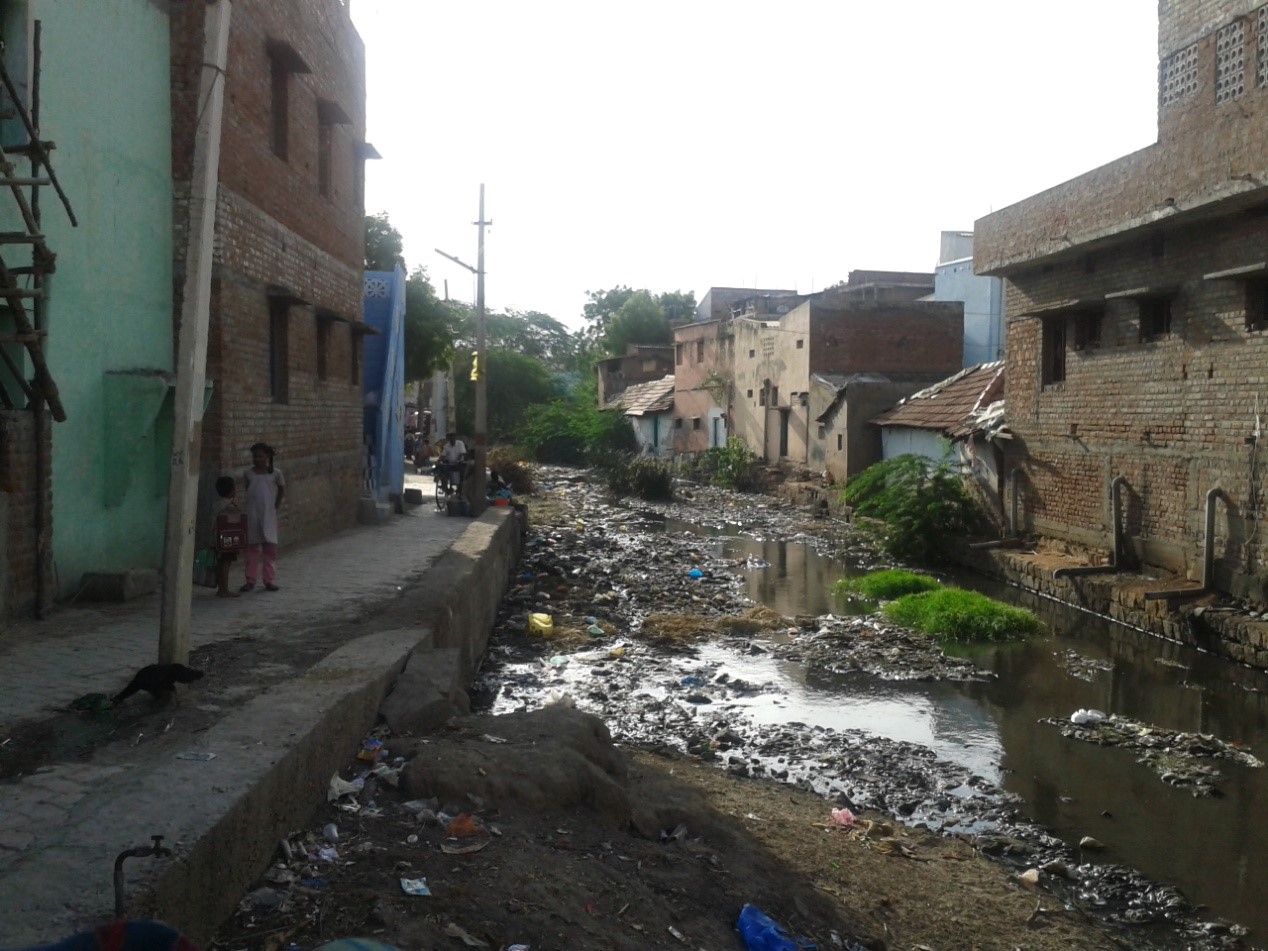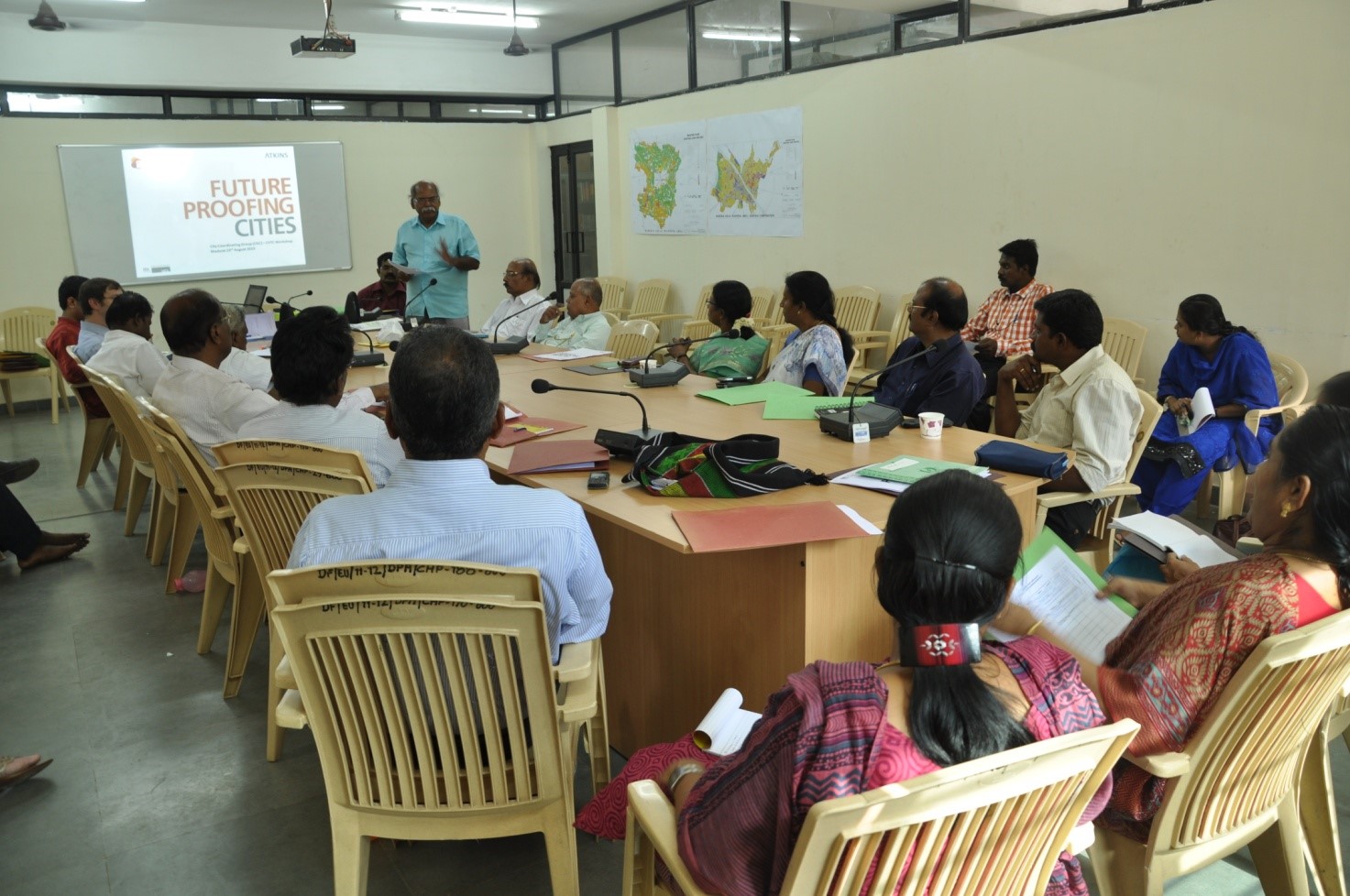'Water Walks' in Madurai
'Water Walks' in Madurai
At the beginning of this month it was announced in the Times of India that drinking water is now going to be supplied to residents in Madurai only once in every four days. This is just one recent example of how the city is struggling to adapt in the face of a complicated set of development risks, made worse by climate change. We trace the decision to limit drinking water back to the geography, history and recent environmental management of the city to tell a story of how a city needs to ‘future proof’ against such risks.
Madurai developed as a collection of villages on the banks between the main river Vaigai and the minor river Kiruthumal. As the population grew and the city developed, the river served the needs of the inhabitants for bathing, washing and agriculture, as well as cultural life and religious ritual. It also served the important role of high-quality ground water recharge and as a flood carrier.
Until the 1970s, the Kiruthumal river was flowing full throughout the entire year. With a bed width of between 20 to 50 feet it supplied an intricate network of water tanks and canals. The remnants of the old villages can be seen along the river and many of the historically important temples were surrounded by wide and full water tanks.
 However, the pattern of development in Madurai during the late 20th and 21st first century has significantly affected the quality of the Kiruthumal River and its ability to serve the needs of inhabitants. This essential ‘blue-green infrastructure’ is now severely disrupted by urban development encroaching onto the river, blocking of channels and the concreting of the river bed. A toxic mix of plastic and industrial waste clogs the flow and chokes cattle to death, and many of the historically and functionally important tanks are now completely dry. Yet families, often housed in informal settlements, still depend on the river for agriculture, animal husbandry, drinking water and sanitation. Their vulnerability is significantly multiplied by their dependence on the river and they are disproportionately impacted by its degradation.
However, the pattern of development in Madurai during the late 20th and 21st first century has significantly affected the quality of the Kiruthumal River and its ability to serve the needs of inhabitants. This essential ‘blue-green infrastructure’ is now severely disrupted by urban development encroaching onto the river, blocking of channels and the concreting of the river bed. A toxic mix of plastic and industrial waste clogs the flow and chokes cattle to death, and many of the historically and functionally important tanks are now completely dry. Yet families, often housed in informal settlements, still depend on the river for agriculture, animal husbandry, drinking water and sanitation. Their vulnerability is significantly multiplied by their dependence on the river and they are disproportionately impacted by its degradation.
The Future Proofing Cities India project, led by Atkins with the Development Planning Unit of the University College London, the Indian Institute of Human Settlement and the DHAN Foundation, is examining the processes of rapid urban growth in Madurai and Bangalore and aims to develop actionable strategies for sustainable development and resource scarcities, while reducing multi-dimensional poverty. The project began with a diagnostic of the risks and vulnerabilities to climate change and is now in the action planning stage, which is focussed on the key issues of water supply and sanitation and the complex interactions with social and other infrastructure domains. The action planning approach of the Future Proofing Indian Cities project moves beyond expert-dominated top-down solutions, towards co-production of knowledge and solutions by involving a wide range of local stakeholders.
During fieldwork for this project in November 2013 an innovative new way of understanding and finding solutions to the complicated risks facing the river emerged. The fieldwork included a series of conducted tours along the river corridor. More than 50 participants, including journalists, officials, academics and activists toured 15 kilometres of the corridor. These ‘Water Walks’ brought these ‘decision-makers’ face to face with life as it is lived close to the river. How sewage frequently contaminates the drinking water, how the foul smell makes houses unpleasant for relatives and visitors, how residents often need to wade through wastewater during flooding incidents, the prevalence of diseases such as diarrhoea and skin infection, and the infestation of mosquitoes, fleas, rodents and snakes – as well as the systemic causes of the degradation.
The Water Walk, initiated by the project, has already left an enduring impact. By bringing people from the community and institutions together to focus on the lived experience of the degraded river corridor, the Water Walk rapidly became not just a means of documenting impacts and vulnerability, but also a forum for interaction and deliberation. It was true action–planning in action. Ideas generated during the Water Walk were then explored in the multi-stakeholder workshops that followed.
 An evocative film on the state of the river and its impact on inhabitants was also created by the architect Balaji. This artistic response to the river as experienced during the Water Walk further stimulated creative solutions to the current state of the river, building resilience for those who live in the corridor. This led to the emergence of collective action-planning, bringing together diverse viewpoints and lived realities and generating an awareness of the interactions between the disrupted water system, the poor sewage system, the lack of effective waste collection and disposal, the water scarcity, and flooding.
An evocative film on the state of the river and its impact on inhabitants was also created by the architect Balaji. This artistic response to the river as experienced during the Water Walk further stimulated creative solutions to the current state of the river, building resilience for those who live in the corridor. This led to the emergence of collective action-planning, bringing together diverse viewpoints and lived realities and generating an awareness of the interactions between the disrupted water system, the poor sewage system, the lack of effective waste collection and disposal, the water scarcity, and flooding.
The Water Walks have been a catalyst for the growing social movement in Madurai and they are now a regular occurrence. The Water Walks, and the problems that are documented, are frequently reported in the local media as part of the growing river restoration advocacy campaign. There are a growing number of social groups, who gather to clean up and protect water tanks and channels, such as the ‘Wake up Madurai’, a volunteer collective who work selflessly to help conserve waterbodies.
All these local initiatives have stimulated the wide and growing awareness at all levels of society that the liveability of the Madurai and the future of the city’s residents, businesses and tourism industry depends on a healthy water infrastructure. While the news of Madurai’s drinking water supply is alarming, there is hope that if the local community and governments work together now, water issues can be prevented in the future.
We occasionally invite bloggers from around the world to provide their experiences and views. The views expressed here are those of the author, and not necessarily those of CDKN
For more information, contact elizabeth.gogoi@cdkn.org
Photos courtesy of Atkins
